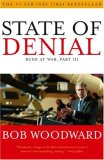Summary | Excerpt | Reviews | Beyond the book | Read-Alikes | Genres & Themes | Author Bio

Bush at War, Part III
by Bob WoodwardState of Denial examines how the Bush administration avoided telling the truth about Iraq to the public, to Congress, and often to themselves.
"Insurgents and terrorists retain the resources and capabilities to sustain and even increase current level of violence through the next year." This was the secret Pentagon assessment sent to the White House in May 2006. The forecast of a more violent 2007 in Iraq contradicted the repeated optimistic statements of President Bush, including one, two days earlier, when he said we were at a "turning point" that history would mark as the time "the forces of terror began their long retreat."
State of Denial examines how the Bush administration avoided telling the truth about Iraq to the public, to Congress, and often to themselves. Two days after the May report, the Pentagon told Congress, in a report required by law, that the "appeal and motivation for continued violent action will begin to wane in early 2007."
In this detailed inside story of a war-torn White House, Bob Woodward reveals how White House Chief of Staff Andrew Card, with the indirect support of other high officials, tried for 18 months to get Defense Secretary Donald Rumsfeld replaced. The president and Vice President Cheney refused. At the beginning of Bush's second term, Stephen Hadley, who replaced Condoleezza Rice as national security adviser, gave the administration a "D minus" on implementing its policies. A SECRET report to the new Secretary of State Rice from her counselor stated that, nearly two years after the invasion, Iraq was a "failed state."
State of Denial reveals that at the urging of Vice President Cheney and Rumsfeld, the most frequent outside visitor and Iraq adviser to President Bush is former Secretary of State Henry Kissinger, who, haunted still by the loss in Vietnam, emerges as a hidden and potent voice.
Woodward reveals that the secretary of defense himself believes that the system of coordination among departments and agencies is broken, and in a SECRET May 1, 2006, memo, Rumsfeld stated, "the current system of government makes competence next to impossible."
State of Denial answers the core questions: What happened after the invasion of Iraq? Why? How does Bush make decisions and manage a war that he chose to define his presidency? And is there an achievable plan for victory?
Bob Woodward's third book on President Bush is a sweeping narrative -- from the first days George W. Bush thought seriously about running for president through the recruitment of his national security team, the war in Afghanistan, the invasion and occupation of Iraq, and the struggle for political survival in the second term.
After more than three decades of reporting on national security decision making -- including his two #1 national bestsellers on the wars in Afghanistan and Iraq, Bush at War (2002) and Plan of Attack (2004) -- Woodward provides the fullest account, and explanation, of the road Bush, Cheney, Rumsfeld, Rice and the White House staff have walked.
Bob Woodward's latest book on the Bush administration (following Bush at War, 2002; and Plan of Attack, 2004) doesn't pick up where Plan of Attack left off but instead sweeps back to offer an overview of
the Presidential life and times of George W. Bush, from the days when he first thought seriously about running for President, through the recruitment of his national security team, the wars in Afghanistan and Iraq, and his second term as President.
The media reviews for State of Denial are mixed. While most praise
the book itself, a number of reviewers comment on the considerable delta between Woodward's depiction of Bush in his first two books and his portrayal of him in State of Denial. Woodward's portrayal of Bush as an intellectually
incurious man whose religious convictions make him disinclined to deviate from his chosen path even if, in Bush's words, "Laura and Barney are the only ones who support me" (Barney being the presidential dog), stands in contrast to the
resolute leader of Bush at War (2002), standing firm at the helm of his country. As Rick Perlstein, writing for the New York Observer asks, "Why couldn’t Mr. Woodward have exploited his
unique insider access to alert the Washington establishment sooner about the danger of harboring this feckless man-child in their midst? ... Or to put it in a way Bob Woodward would find familiar: What did the reporter know and when did he know it?"..continued
Full Review
(484 words)
This review is available to non-members for a limited time. For full access,
become a member today.
(Reviewed by BookBrowse Review Team).
Robert Upshur Woodward, known as Bob, was born in March 1943 in Geneva, Illinois. He studied history and English literature at Yale, receiving his B.A. in 1965, after which he spent four years as a Naval officer. He was discharged as a Lieutenant in 1970 after serving as an aide to the Chief of Naval Operations, Admiral Thomas H Moorer. He was hired by The Washington Post but was let go after his two-week trial because he lacked any experience as a journalist. After a year working for the Montgomery Sentinel, he reapplied to The Washington Post and was given a job in August 1971. Less than a year, later Woodward and Carl Bernstein were assigned to investigate the burglary of the headquarters of the Democratic National ...
This "beyond the book" feature is available to non-members for a limited time. Join today for full access.

If you liked State of Denial, try these:

by Mahvish Khan
Published 2009
Outraged that her country was illegally imprisoning people at Guantanamo, Mahvish Khan volunteered to translate for the prisoners. Her story is a challenging, brave, and essential test of who she is —and who we are.

by Robert Kagan
Published 2007
From the author of the immensely influential and best-selling Of Paradise and Power—a major reevaluation of America’s place in the world from the colonial era to the turn of the twentieth century.
If there is anything more dangerous to the life of the mind than having no independent commitment to ideas...
Click Here to find out who said this, as well as discovering other famous literary quotes!